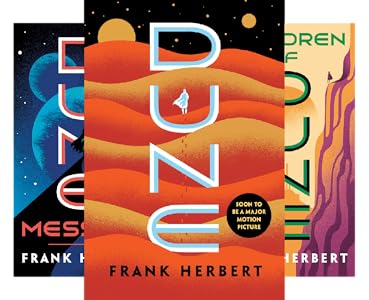
![]() Sisterhood of Dune by Brian Herbert & Kevin J. Anderson
Sisterhood of Dune by Brian Herbert & Kevin J. Anderson
Sisterhood of Dune is the latest installment by Brian Herbert and Kevin J. Anderson in the add-ons to Frank Herbert’s classic DUNE series. To be honest, I gave up on the series after The Battle of Corrin — the third book in the opening LEGENDS OF DUNE group — after it continued a downward spiral from a solid if not inspiring book one (The Butlerian Jihad). I wish I could say Sisterhood of Dune recaptured my interest, but unfortunately I found many of the same problems that caused me to give up the earlier series.
The human race has won against the machines, but the Butlerians, led by Manford Torondo, are trying to force the complete rejection of nearly all technology (while blind or self-rationalizing about their own uses of said tech, of course). Meanwhile, the Bene Gesserit is in its embryonic stages as the very first Reverend Mother, Raquella Berto-Anirul, continues to try to find a way to create others in her Sisterhood, even as they explore the possibilities of a human breeding program, aided by “thinking machines” that would bring the wrath of the Butlerians down on them. As these two groups grow in power, the Corinno Emperor is having a hard time solidifying his own and standing up against the Butlerians especially, even as other groups and schools and factions rise and fall: the Suk school; the Swordmaster school; the Mentat school led by Gilbertus Albans, who has his own dangerous secret; the Venport Space Fleet, which is the Navigators Guild in its nascent stage; and so on. Along with all the galactic politics, more personal motives arise as two young Harkonnen heirs seek vengeance on the disappeared Vorian Atreides who enters back on stage after long absence. And it’s a DUNE book, so we’ll make a stop off in Arrakis and see some sandworms.
 There are always several potential pitfalls in prequels. One is that the big-picture suspense is a bit lacking as we know where much of the story ends up. The other is that the books become too much of a connect-the-dots mechanical adding up of the steps required to get us to where we know we’re going. I can’t say the book avoids either of these problems. The stop-off on Arrakis, for instance, feels especially detached and perfunctory.
There are always several potential pitfalls in prequels. One is that the big-picture suspense is a bit lacking as we know where much of the story ends up. The other is that the books become too much of a connect-the-dots mechanical adding up of the steps required to get us to where we know we’re going. I can’t say the book avoids either of these problems. The stop-off on Arrakis, for instance, feels especially detached and perfunctory.
As with the earlier books, characterization tends to be flat and simply presented; none of the characters really come fully alive or feel uniquely themselves. The underlying pattern of ideals and principles walking the precipice (and sometimes falling over it) of fanaticism and hypocrisy is interesting, but its expression is a bit too simply and flatly presented in terms of plot, character, and prose. The structure, made up of a lot of short little chapters, is a common one, but it’s one I’ve never warmed up to and I can’t say it does much to enhance the reading experience here. If anything, it probably hurts characterization as we spin off so quickly from one character to another.
If you’ve liked the earlier books, my guess is Sisterhood of Dune is not going to feel much different and so you’ll probably enjoy its plot-driven story despite the flat characterization and style and the somewhat mechanical collection of the necessary pieces to put together the original Dune story. If you’ve tried the earlier ones and didn’t care for them, Sisterhood of Dune isn’t going to be an improvement. And if you’ve never dipped into the DUNE world at all, then grab the original, which is a true must-read classic that more than earns its status. Sometimes we should leave well enough alone.



Sometimes we should leave well enough alone
Well said. With very few exceptions, allowing another author to continue a series never works for me. With the Dune novels, I found the plotting far less complex, the characters much thinner/weaker, and the overall style simply paled in comparison.